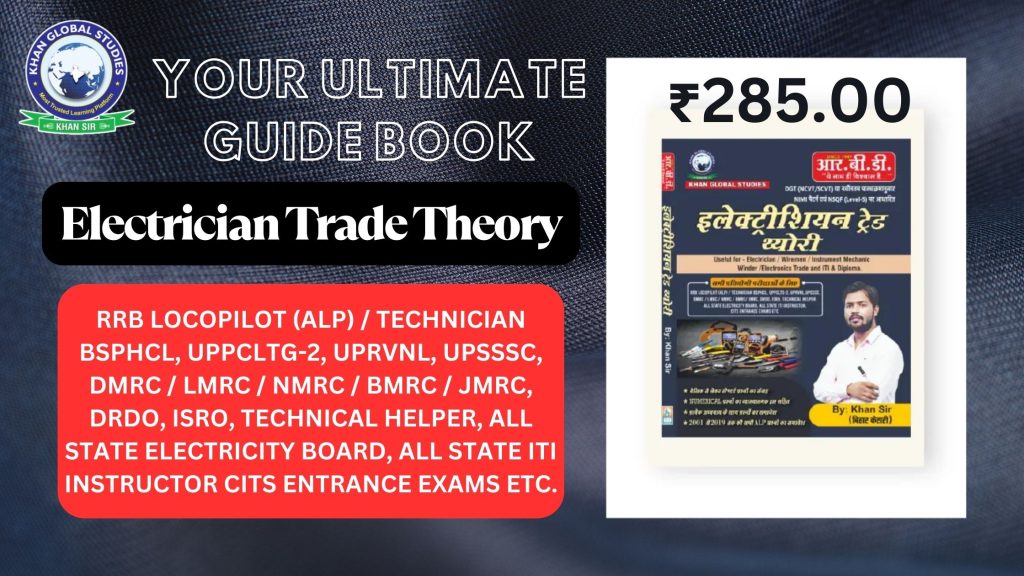Electrician Trade Theory Guide for ITI & Diploma Students: Electrician Trade Theory is an essential foundation for aspiring professionals in the electrical field. Whether you’re preparing for a career as an electrician, wireman, instrument mechanic, or engaging with ITI and diploma courses, this guide provides clear, actionable insights into Electrician Trade Theory and its applications. For those preparing for competitive exams, understanding the trade thoroughly will set you apart.
This blog dives deep into the components of Electrician Trade Theory, its relevance, and why it’s critical for technical roles. By the end, you’ll know the components to focus on, how to excel in your training, and the career opportunities this knowledge unlocks.
What is Electrician Trade Theory?
Electrician Trade Theory is part of technical education programs like ITI (Industrial Training Institutes) and diploma courses that emphasize both theoretical and practical knowledge about electrical wiring, systems, and equipment. It covers essential concepts in electrical engineering and troubleshooting to prepare students for real-world applications.
Through this trade-specific training, students learn about sophisticated tools, safety regulations, and the hands-on skills essential to technical jobs across industries.
Why is Electrician Trade Theory Important?
Mastering Electrician Trade Theory is pivotal in ensuring career growth in electrical and electronics trades. Here’s why it matters so much:
- Job Readiness: It teaches foundational skills essential for entry-level jobs in industries such as power generation, electronics manufacturing, and construction.
- Competitive Exams: It is critical for performing well in technical exams like RRB Locopilot, Technician exams, State Electricity Board, DRDO, and ISRO recruitment tests.
- Career Advancement: The knowledge gained from these courses opens up career opportunities as skilled tradesmen or advanced roles in maintenance, instrument mechanics, and automation.
Now let’s explore the key components of Electrician Trade Theory in detail.
Key Components of Electrician Trade Theory
1. Basic Electrical Concepts
Understanding the basics of electricity is the foundation for any electrician. These concepts include the following:
a. Current, Voltage, and Resistance
Learn about Ohm’s Law, the relationship between current, voltage, and resistance, and their relevance in electronic circuits.
b. Electric Power and Energy
Understand concepts such as power ratings, efficiency, and energy usage calculations for different equipment.
c. Types of Circuits
Distinguish between series and parallel circuits and their specific use cases. Gain insights into the fundamentals of circuit design.
2. Electrical Wiring and Installations
Electrical wiring and component installations are core to practical applications. Here’s what students learn in this module:
a. Wiring Techniques
Types of wiring systems (e.g., conduit wiring, surface wiring, etc.), best wiring practices, and how to ensure safety and durability.
b. Switches and Fixtures
Learn how to install and troubleshoot common components like switches, sockets, and light fixtures.
c. Industrial and Residential Applications
Explore how electrical wiring works in homes, offices, and industrial setups. This section includes learning about fuse boxes, circuit breakers, and grounding.
3. Tools and Equipment
An electrician’s proficiency depends on their ability to use the right tools effectively:
a. Measurement Instruments
Understand tools like multimeters, voltage testers, and insulation resistance meters.
b. Wires and Connectors
Explore the different types of wires, connectors, and terminations used in electrical work.
c. Advanced Tools
Learn about cable pulling equipment, crimping tools, and soldering techniques essential for technical work.
4. Blueprint Reading and Estimation
Electrical blueprints and accurate project estimation are vital for successful installations.
a. Blueprint Interpretation
Learn how to read electrical diagrams and schematics to understand circuit design and installation plans.
b. Cost and Material Estimation
Understand the methods of estimating material requirements and costs for various projects accurately.
5. Safety Practices and Regulations
Adherence to safety standards is a must in the electrical field.
a. Electrical Safety Standards
Learn about national and international safety standards like NEC (National Electrical Code) and OSHA (Occupational Safety and Health Administration).
b. Personal Protective Equipment (PPE)
Introduction to safety tools like rubber gloves, insulated boots, and protective eyewear.
c. Emergency Protocols
Training on how to handle electrical accidents, such as shocks and fires, and how to use first-aid techniques effectively.
6. Troubleshooting and Maintenance
Being skilled at diagnosing and resolving electrical issues is critical for an electrician’s role.
a. Common Faults
Identify issues like short circuits, overloads, or grounding problems.
b. Equipment Servicing
Learn routine maintenance practices for systems such as generators, transformers, and electric motors.
c. Diagnostic Techniques
Use of tools like infrared thermometers and oscilloscopes for detailed fault analysis.
Competitive Exams Requiring Electrician Trade Knowledge
Mastery of Electrician Trade Theory not only prepares students for jobs but also enables them to excel in competitive examinations such as:
- Railway Locopilot (RRB ALP)
- State Electricity Board Technician Exams
- Department of Science and Research (ISRO, DRDO)
- Metro Rail Corporations (DMRC, LMRC, BMRC)
These exams often test knowledge in wiring, motor winding, and troubleshooting techniques, making your foundational understanding a key to success.
Career Opportunities After Mastering Electrician Trade Theory
The knowledge and skills gained open the doors to rewarding career paths in industries such as:
- Construction Industry
- Power Generation and Distribution
- Electronics Manufacturing
- HVAC and Maintenance Services
Roles range from Electrician and Instrument Mechanic to Supervisory positions in technical departments.
How to Excel in Electrician Trade Theory?
Enroll in Professional Training Programs
Join ITI-approved programs that offer extensive training with experienced instructors.
Hands-On Practice
Ensure you balance theoretical understanding with hands-on implementation of circuits, wiring installations, and troubleshooting.
Stay Updated on Technology
New technologies like IoT and automation are reshaping the electrical industry. Stay updated with advanced tools and modern techniques relevant to these innovations.
Unlock Your Potential in the Electrical Field
A solid grasp of Electrician Trade Theory sets you up for success in the evolving field of electrical engineering. Whether you’re preparing for a career, competitive exams, or advanced studies, this guide offers all the foundational elements you need to excel. Are you ready to level up your skills? Explore comprehensive resources, courses, and materials at Khan Global Studies to fast-track your learning.




